苏教版英语七年级下册第一课
《初中英语七年级下册第1课》课件

2.Add as many words as you can to make phrases. play the drums, speak English, help with math, be good at telling stories, be good with old people,
play the drums/the piano/basketball/tennis speak English/Chinese/French/Japanese
Students Wanted for Chess Day
Do you have time after school on September 7th? Do you like to talk to other people? Do you like to play games with them? Can you play chess? Then you can join our school Chess Day! It is fun and interesting. You can make new friends, too! Please call Ms. Chen at 646-8734.
句子 1. We need...for... 我们需要…来…… 2. Do you want to...? 你想要……吗? 3. Can you...? 你会......吗? 4. Are you good at/with...? 你擅长/善于应付……吗? 5. Call me at ... 拨……(号码)联系我。
Do you want to...? Are you good with...? Can you...? Are you good at...?
苏教牛津译林版初中英语七年级下册Unit 1 Dream homes Reading(1)导学案

苏教牛津译林初中英语重点知识精选掌握英语语法知识,巩固词汇量和各种语态,学好英语基础一定要扎实,大家一起练习吧!牛津译林初中英语和你一起共同进步学业有成!Unit 1 Dream homes 【教学目标】:1、学习新单词及短语。
2、能用英语简单介绍自己或他人的家。
【教学重难点】:简单介绍课文大意。
【自主学习】:一、汉译英:1、英里2、花园3、公寓4、中心5、起居室6、分享二、翻译短语:1、来自2、一杯茶3、一个美丽的花园4、和我的狗玩的开心5、莫斯科中心6、在第七层7、在床上听音乐8、我和我的妹妹分享一个卧室【合作探究】:1、自由朗读课文一、二节,Ask the questions:(1) 、What kind of home does Neil live in ?(2) 、What kind of home does Anna live in ?2、再读课文,划出重点词语及句子。
3、讲解知识点:(1) 、favourite =like…….bestMy favourite room is the kitchen .= I the kitchen (2)、share sth with sb 和某人分享某物我和我的妹妹分享一个大蛋糕。
I a big cake my sister.4、熟读课文,简单复述课文大意。
【达标巩固】:一、翻译短语:1、我最爱的房间2、享受一杯茶3、住在一个公寓里4、晚饭后5、喜欢听音乐6、在6月7号二、根据句意,用单词的正确形式填空。
1、Would you like (go) swimming with me ?2、Every student dreams of (have) a holiday without homework.3、Our classroom is on the (two) floor of the building .4、Tomorrow is my brother’s (seven) birthday.5、I watch TV in my (sit) room.相信自己,就能走向成功的第一步教师不光要传授知识,还要告诉学生学会生活。
江苏省七年级英语下册 Unit 1 Dream homes(第4课时)教案 (新版)牛津版

Unit 1 Dream homesGrammarI. Teaching aims and learning objectivesBy the end of the lesson, students should be able to:1. learn about cardinal numbers and ordinal numbers;2. use cardinal numbers to describe numbers, sizes, etc;3. use ordinal numbers to describe dates, floors, etc.II. Teaching contents1. New words and phrases: zero, hundred, thousand, million, foot, square, metre,area, over, square metre, in size, have an area of2. New structures: The CN Tower is 1,815 feet tall.Women’s Day is on the eighth of March.He is always the first to come to school in our class.III. Focus of the lesson and predicted area of difficulty1. To remember all the ordinal numbers;2. To use the cardinal and ordinal numbers correctly.IV. Teaching proceduresCardinal numbersStep 1 Lead-inT: Hello, boys and girls. Let’s enjoy a number song.T: Let’s play a number game in groups of four. Say the number 1, 2, 3 … in turn. When someone meets 7, like 7, 17, or the times of 7, like 7, 14, he or she should spell it instead of saying the number.【设计意图:学生对1-20的基数词比较熟悉,可通过游戏更加深刻的复习数字,同时提高他们学习的积极性和兴奋度。
江苏省七年级英语下册 Unit 1 Dream homes(第2课时)教案 (新版)牛津版
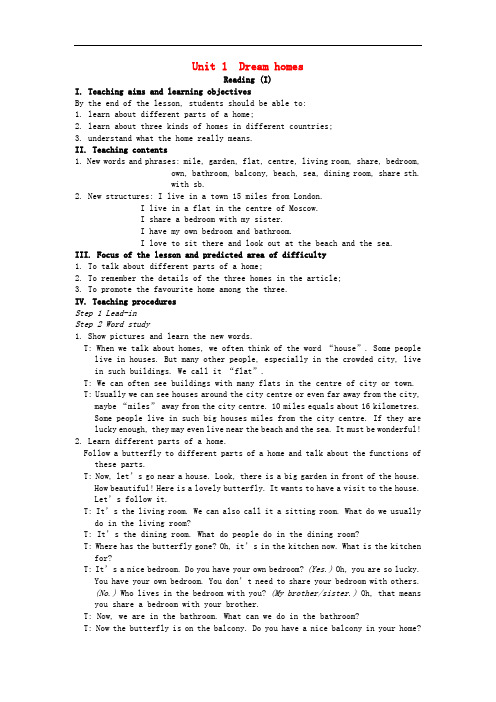
Unit 1 Dream homesReading (I)I. Teaching aims and learning objectivesBy the end of the lesson, students should be able to:1. learn about different parts of a home;2. learn about three kinds of homes in different countries;3. understand what the home really means.II. Teaching contents1. New words and phrases: mile, garden, flat, centre, living room, share, bedroom,own, bathroom, balcony, beach, sea, dining room, share sth.with sb.2. New structures: I live in a town 15 miles from London.I live in a flat in the centre of Moscow.I share a bedroom with my sister.I have my own bedroom and bathroom.I love to sit there and look out at the beach and the sea.III. Focus of the lesson and predicted area of difficulty1. To talk about different parts of a home;2. To remember the details of the three homes in the article;3. To promote the favourite home among the three.IV. Teaching proceduresStep 1 Lead-inStep 2 Word study1. Show pictures and learn the new words.T: When we talk about homes, we often think of the word “house”. Some people live in houses. But many other people, especially in the crowded city, live in such buildings. We call it “flat”.T: We can often see buildings with many flats in the centre of city or town. T: Usually we can see houses around the city centre or even far away from the city, maybe “miles”away from the city centre. 10 miles equals about 16 kilometres.Some people live in such big houses miles from the city centre. If they are lucky enough, they may even live near the beach and the sea. It must be wonderful!2. Learn different parts of a home.Follow a butterfly to different parts of a home and talk about the functions of these parts.T: Now, let’s go near a house. Look, there is a big garden in front of the house.How beautiful! Here is a lovely butterfly. It wants to have a visit to the house.Let’s follow it.T: It’s the living room. We can also call it a sitting room. What do we usually do in the living room?T: It’s the dining room. What do people do in the dining room?T: Where has the butterfly gone? Oh, it’s in the kitchen now. What is the kitchen for?T: It’s a nice bedroom. Do you have your own bedroom? (Yes.)Oh, you are so lucky.You have your own bedroom. You don’t need to share your bedroom with others.(No.) Who lives in the bedroom with you? (My brother/sister.) Oh, that means you share a bedroom with your brother.T: Now, we are in the bathroom. What can we do in the bathroom?T: Now the butterfly is on the balcony. Do you have a nice balcony in your home?What do you usually do on the balcony?T: What a lovely butterfly! Thank you for showing us around the house.3. Complete Exercise B1 on Page 9.Step 3 Passage presentation1. Lead in three different kinds of homes around the world.T: Nowadays, many people are using smart mobile phones. They make communication much easier. For example, we often use “Wechat”to communicate with our friends.Simon has some foreign friends. They use “Wechat” to tell Simon about their homes. They are Neil, Anna and Stephen. Neil sends a video about his home. Anna sends a period of speech sounds about her home. And Stephen sends Simon some nice pictures and a short article about his home. Which one would you like to learn about first?2. Watch a video about Neil’s home and choose the right answers.T: Now, let’s watch Neil’s video and try to choose the right answers.3. Listen to Anna and answer some questions.T: Let’s go on to learn about Anna’s home. Please listen to Anna and try to answer the two questions.4. Read Stephen’s article and judge the sentences.T: Here are some nice pictures and an article from Stephen. Read and try to decide whether the following sentences are true or false.Step 4 Practice1. Read aloud after the tape.T: Please open your books and turn to Page 8. Let’s read after the tape.2. Do the question chains.T: Do you understand the passage well? Now, let’s do the question chains. Please prepare at least five questions about the three homes.3. Complete Exercise B2.4. Complete Exercise B4.5. Do a promotion.T: Now we know the three homes from three different countries very well. Which one do you like best? Why do you like it best? Show your choice and your reasons to the class.6. Emotional education.T: East or west, home is best! Big or small, Love is all!V. Homework1. Finish the exercises in your book.2. Recite or retell Homes around the world.3. Tell parents you love them and your home.【教学反思】。
江苏省七年级英语下册 Unit 1 Dream homes(第1课时)教案 (新版)牛津版
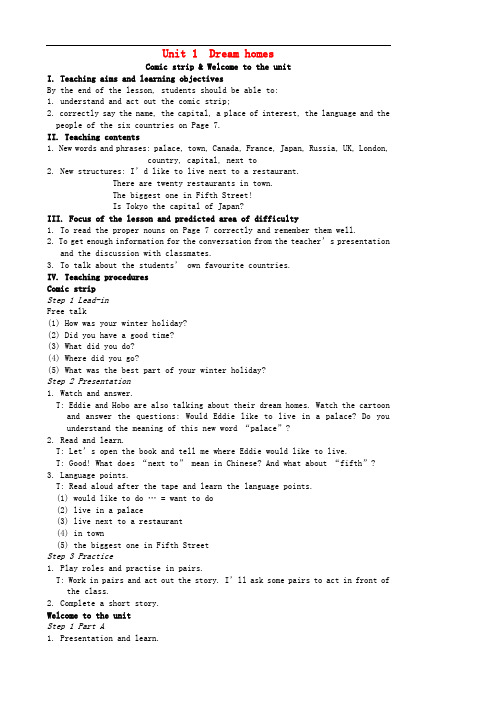
Unit 1 Dream homesComic strip & Welcome to the unitI. Teaching aims and learning objectivesBy the end of the lesson, students should be able to:1. understand and act out the comic strip;2. correctly say the name, the capital, a place of interest, the language and thepeople of the six countries on Page 7.II. Teaching contents1. New words and phrases: palace, town, Canada, France, Japan, Russia, UK, London,country, capital, next to2. New structures: I’d like to live next to a restaurant.There are twenty restaurants in town.The biggest one in Fifth Street!Is Tokyo the capital of Japan?III. Focus of the lesson and predicted area of difficulty1. To read the proper nouns on Page 7 correctly and remember them well.2. To get enough information for the conversation from the teacher’s presentationand the discussion with classmates.3. To talk about the student s’ own favourite countries.IV. Teaching proceduresComic stripStep 1 Lead-inFree talk(1) How was your winter holiday?(2) Did you have a good time?(3) What did you do?(4) Where did you go?(5) What was the best part of your winter holiday?Step 2 Presentation1. Watch and answer.T: Eddie and Hobo are also talking about their dream homes. Watch the cartoon and answer the questions: Would Eddie like to live in a palace? Do you understand the meaning of this new word “palace”?2. Read and learn.T: Let’s open the book and tell me where Eddie would like to live.T: Good! What does “next to” mean in Chinese? And what about “fifth”? 3. Language points.T: Read aloud after the tape and learn the language points.(1) would like to do … = want to do(2) live in a palace(3) live next to a restaurant(4) in town(5) the biggest one in Fifth StreetStep 3 Practice1. Play roles and practise in pairs.T: Work in pairs and act out the story. I’ll ask some pairs to act in front of the class.2. Complete a short story.Welcome to the unitStep 1 Part A1. Presentation and learn.Show pictures to learn about different countries: Japan, the USA, France, Canada, the UK and Russia.JapanT: Boys and girls, please look at the picture. Who knows the name of this place?T: Yes, it’s Mount Fuji. There is thick white snow at the top of the mountain all year round. The view in and around this mountain is really wonderful. Do you know which country it is in?T: That’s right. It’s in Japan. Mount Fuji is near Tokyo, the capital of Japan.Do you understand the meaning of “capital”?T: What do we call the people who live in Japan? Yes, we call them Japanese or Japanese people. And “Japanese”also means the language that Japanese people speak.T: We’ve learnt something about Japan. Would you please say something about this picture or this country? For example, the capital of Japan is Tokyo. Who’d like to go on?T: Good job! So much for this picture. Now, look at the next picture.2. Look and match.Finish Part A on Page 7.3. Complete and say.T: We’ve learnt a lot about different countries. Let me help you remember them well. Look at this table. First, would you please complete it?T: Would you please say several sentences about each country? You can first practise with your partner. Then I’ll ask some of you to report one of them to the class.Step 2 Part B1. Listen and answer.(1) Which picture are Annie and Simon talking about?(2) What do you know from their conversation?2. Read aloud.3. Make up similar conversations.Step 3 PracticeShow pictures of famous people from the six countries and ask the students to do the question chains. Vote for the best question and the best answer.T: I’ll show you some famous people from the six countries. Let’s do a “question chain”. Six questions for each of them. Let’s see who will raise the best question and who will give the best answer. Are you ready? OK. Let’s start from …T: Great! Most of you did a very good job. Which question and which answer do you think are the best?V. Homework1. Tell your parents about your favourite country among the six in English.2. Remember the new language points.。
七年级下册第一课英语

七年级下册第一课英语七年级下册英语课本的第一课通常涵盖了新的语法知识、词汇、短语以及对话或短文等内容。
不过,请注意,不同版本的教材可能有所不同。
以下是一个假设性的七年级下册英语第一课的示例内容:Lesson 1: A New StartVocabulary:studentteacherclassroomblackboarddeskchairbookpencileraserbackpackPhrases:be excited aboutlook forward toa new startmake new friendsDialogue:A: Hi, I'm your new classmate. My name is Alice.B: Hi, Alice. I'm Bob. Welcome to our class! Are you excited about the new school year?A: Yes, I am. I'm looking forward to making new friends and learning new things.B: Me too. Let's start this new year together.Reading Passage:It's a new school year, and Alice is excited about starting her first day at her new school. She walks into the classroom and sees her new teacher writing on the blackboard. Alice finds her desk and sits down. She takes out her book and pencil and gets ready to learn.Alice looks around the classroom and sees some familiar faces and some new ones. She is looking forward to making new friends this year. She knows that with hard work and dedication, she can achieve her goals in this new start.这只是一个示例,并不代表任何特定教材的实际内容。
苏教牛津译林版初中英语七年级下册Unit1 Dream homes3PPT课件

11th = eleventh 12th = twelfth 13th = thirteenth 14th =fourteenth 15th = fifteenth 16th =sixteenth 17th = seventeenth 18th =eighteenth 19th =nineteenth 20th = twentieth
5. Two million three hundred and two 2,000,302
6. nine hundred million eight thousand seven hundred and eight 9,008,708
¥598.00
five hundred and ninety-eight
2. 六月五号是我的生日. My birthday is on the fifth of June.
3. 这是我第三次在大海里游泳. This is my third time to swim in the sea.
4. 他住在第二十二楼. He lives on the twenty-second floor.
How do we write them
1. one hundred and twenty-five 125
2. two thousand three hundred and eleven 2,311
3. ten thousand and eleven 10,011
4.one hundred thousand one hundred and two 100,102
five hundred and sixty-seven thousand, two hundred and fifteen
苏教版英语七年级下册1-8课单词默写
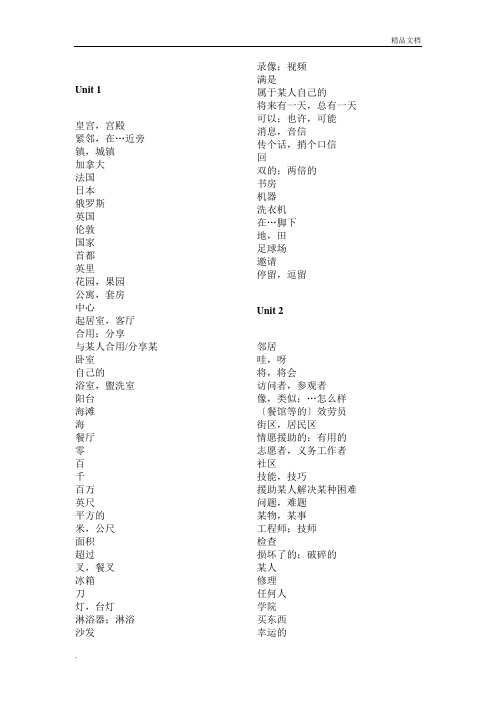
精品文档Unit 1皇宫,宫殿紧邻,在…近旁镇,城镇加拿大法国日本俄罗斯英国伦敦国家首都英里花园,果园公寓,套房中心起居室,客厅合用;分享与某人合用/分享某卧室自己的浴室,盥洗室阳台海滩海餐厅零百千百万英尺平方的米,公尺面积超过叉,餐叉冰箱刀灯,台灯淋浴器;淋浴沙发录像;视频满是属于某人自己的将来有一天,总有一天可以;也许,可能消息,音信传个话,捎个口信回双的;两倍的书房机器洗衣机在…脚下地,田足球场邀请停留,逗留Unit 2邻居哇,呀将,将会访问者,参观者像,类似;…怎么样〔餐馆等的〕效劳员街区,居民区情愿援助的;有用的志愿者,义务工作者社区技能,技巧援助某人解决某种困难问题,难题某物,某事工程师;技师检查损坏了的;破碎的某人修理任何人学院买东西幸运的精品文档将,将会后天火生火经理办公室办公室职员,上班族警察邮递员公司局,所,站警察局邮政邮局人工作年纪较长的乘火车/公交车/轮船/自行车将来艺术家,〔尤指〕画家听起来生病的;恶心的布告,通知信息下面较好,更好任何事为…担忧设计,构思组,群Unit 3我的没有什么等一会儿元〔人民币单位〕罐,听比萨饼交流学生安静的;寂静的空气,大气新奇的fresh 本地的,当地的慢跑锻炼地铁知名的,著名的西方的歌剧,戏剧戏院,剧场错过,失去向前,前进盼望,期待很快,不久明信片钥匙环,圈;戒指钥匙扣你的;你们的我们的他〔或她、它〕们的她的到处,普及笔盒,笔袋金銮宝座作品,著作艺术品绘画,油画划〔船〕旅馆拥有,全部家乡友好的喂养〔使〕生长,发育;长大,长高小麦嗅,闻到驾车送〔人〕;驾驶,开〔车〕Unit 4跟随;效仿小路,小径不得不,必须北,北方西,西方南,南方东,东方旅游,旅游精品文档千米,公里每人,人人径直地向前移动,进行下去;开竹整天地沿着,顺着路,道路国王记得,记住〔用于动词、形容词或名词后引导从句〕危险的声音森林好笑的,滑稽的笑,大笑长颈鹿相当,非常脖子叶东北方桥穿过,横过笼子,鸟笼在…对面;穿过,横过在…里面在…外面在…上面在…下面指示牌在…上面长椅在另一边,到另一侧宝藏转弯处交通,来往车辆红绿灯应该,应当交叉路口拐角,街角;角落打算为…打算…大量,充足大量,足够出口银行Unit 5令人吃惊的,惊人的统一的,相同的出生,诞生停止做某事[复](用于比拟)倍地球骨头后部;背部脂肪事实和……一样通常的,平常的照例;像往常一样坐下突然低语,耳语灌木丛转身;〔使〕翻转任何人没有人,无人答复,答复奇异的;陌生的离开迅速地,飞快地在……路上发生每件事,每样事物,一切琢磨,想了解,感到惊讶认真地,认真地;小心地搜查,搜寻,搜索他自己自言自语虚弱的,无力的〔猫叫声〕喵拾起拿起,举起吃惊的,惊讶的随后,后来逃离,跑开某人,有人精品文档以前前天厘米,公分渡渡鸟蛇骆驼蚂蚁不多的,少数的干的;枯燥的没有畏惧再也不,不再听说,了解那天,前几天同时三维,立体粉笔三明治普及全世界不迟于,在…之前每,每一至少像……一样英寸请求;要Unit 6户外的迅速,匆忙快点,赶快抱怨那么,那样野营骑自行车运动骑马溜冰骑在外面兔,家兔洞在…旁边,靠近经过;通过经过哎呀,天哪手表站起身,起立逃脱;离开落下,掉落;倒到达;击中,撞她自己单独,单独低的,矮的锁上的注意,发觉到…里面侧,边穿过,通过通过使惊异,使措手不及搭,竖立帐篷木头,木材一段时间,时期朝代,王朝世纪,百年意大利的省从那时期冲动的一点,少许甜的开始变得,变成足够的,充分的决定进入向,朝忘记太…而不能伸手〔脚〕够到爬,攀登失败Unit 7能力信任信不信由你留神,留神座位发送;邮寄甚至精品文档能,能够付费为…付款笔记本募集勇敢的救,救助从…救出…烟,烟雾在隔壁严峻的,厉害的受伤的可以,能,会倾倒爱护冲,奔湿的;未干的;有雨的毯子消防员扑灭烧伤;烧住院时刻;片刻,瞬间点头认真的,认真的;小心的使受伤,损害;疼记者新闻,消息报纸垃圾,废弃物垃圾箱吸〔烟〕顺便问一下,顺便说说照相机没问题X光学期努力地,费力地文章粗心的尽某人最大努力钢琴…做得好较好,更好小提琴在…岁时教;演示;展示先生女士:夫人推举奖;奖品;奖金局部参加短缺,缺少迷失;丧失迷路到…为止;在…之前收到…的来信您忠实的Unit 8宠物pet粗鲁的,不礼貌的金鱼老鼠,耗子鹦鹉膝,膝盖握住,拿喂,喂养教诗歌充分的寻觅,搜寻;打猎藏,隐藏建筑,建筑营地;阵营树枝枝条;棍,棒吠,叫咬打仗;与…打架照顾到…时,直到…为止终止;末尾,终点麻烦吐泡泡温柔的触摸,碰押韵照料,照顾精品文档照顾任何地方重复一直,总是同意;应允养,喂养重;有…重克成长;长大成人讲座;演讲声音,响声;噪音刷;擦软毛,毛皮爪篮子吵闹的,嘈杂的。
最新苏教版英语七年级下册 第一课学习资料

梦,梦想()皇宫,宫殿()首都()阳台()海滩()海()镇,市镇()河,江()梯子()第二(个),第二日()孩子,儿女()雨,雨水()厨房()起居室,客厅()第五,第五日()花园,菜园()公寓,套房()第七,第七日()邻居()餐厅()扶手椅()床头柜()咖啡()矮茶几()碗橱()灯,台灯()书架,书柜()淋浴器,淋浴()洗涤槽,洗碗池()浴室,盥洗室()浴缸,淋浴()便池,抽水马桶()架子()打印机()第三,第三日()第四,第四日()第九,第九日()第十一,第十一日()第十二,第十二日()第二十,第二十个()旅行,旅程()主意,想法()录像()一楼()米,公尺()动词:爬,攀登,攀爬()下雨()合用,分享()种植,生长()烹调,煮()到达()担心,发愁()听起来()停留,逗留,待()梦想中的,理想的()木制的,木头的()第二的()第五的()第七的()友好的()大多数的()整洁的()第三的()第四的()第九的()第十一的()第十二的()第二十的()安静的()自己的()其它的,另外的()介词:在···的上方()到···里面()在···之间()在···的对面()在···的上面()在···的下面()代词:它的()数词:零()十六()十七()十九()七十()九十()千()百万()连词:当···的时候()短语:住在一家餐馆隔壁()···的首都()在世界各地()喜爱做某事()向外看某物()进入到···里()我家里的第二个孩子()经常下雨()在六月五日()在···中心()在一条热闹的街上()在7层楼上()与某人合用/分享某物()种花()做饭()在河上()爬梯子()迫不及待地想做某事()在长途飞行旅程之后()长城()别担心()带某人去某地()颐和园()故宫博物院()与···不同()新电话号码()更容易地记住()至少()没有其他的房间()与某人待在一起()50米长()想要某人做某事()进行淋浴()同时()住在温迪上两层()住在温迪下六层()注:答案见初中英语《知识集锦》五年级语文下册短文阅读及答案宇宙空间既无氧又无水,周围还游荡着无数运动的流星。
苏教牛津译林版初中英语七年级下册Unit 1 Dream homes Reading II学案

苏教牛津译林初中英语重点知识精选掌握英语语法知识,巩固词汇量和各种语态,学好英语基础一定要扎实,大家一起练习吧!牛津译林初中英语和你一起共同进步学业有成!Unit 1 Dream homes Reading II【学习目标】1.进一步理解文章。
2.简单描述自己的家。
【学习重难点】借助图片和关键词复述课文。
【自主学习】(认真阅读课文,完成知识梳理,在课本上做好标注)Ⅰ『基础知识』重点短语:(在课本上用﹏画出来)1.洗脸___________________________2.聊天看电视的好地方__________________3.大部分家_______________________4.做饭______________________________Ⅱ『合作探究』---语言点知识运用与拓展(参考课文注释、参考资料,自我探索总结,C层初步思考,AB层认真思考,全部完成,为课堂交流做好准备)小组讨论,解决预习中的疑难点。
1.I always have fun with my dog there.在那儿我和我的狗总是玩得很愉快。
探究点:have fun后接动词的_______形式。
[指点迷津] have fun意为“过得高兴,玩得愉快”,相当于have a good time/enjoyoneself后接动词-ing形式。
They have a good time in the park. 同义句转换。
They_______ _______ in the park.2. I share a bedroom with my sister.我和我姐姐合住一间卧室。
探究点:share有什么用法?[指点迷津] share的意思是“分享;合用;分担”。
Good friends should share happiness and sadness.好朋友应该共享快乐,分担忧愁。
[注意] share sth. with sb.和某人分享/共用某物。
苏教版初中英语七年级下册Unit1《DreamhomesReading1》课件
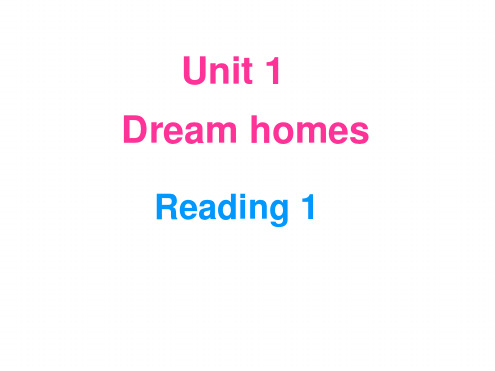
Anna's home:
Anna lives with her family in a _f_la_t_ in the c_e_n_t_r_e_ of Moscow. Her house is not big so she has tos_h_a_r_e_ a bedroom _w__it_h_ her sister. They often listen to music_i_n _b_e_d_. __A_f_t_e_r dinner, they like to watch TV and
Try to retell( 复述) their homes.
Neil
a town 15 miles from London
favourite room
kitchen
enjoy garden have fun
Anna
a flat the centre of Moscow
On the seventh floor living room
chat in the___li_vi_n_g__r_o_o_m__.
Stephen's home:
Stephen is a boy from _th__e U__S_A__. He lives in a _la_r_g_e_ house near the _s_e_a_. There are 8 rooms in his house. The _b_a_lc_o_n_y_ is his favourite place . He often sits there and looks _o_u_t_a_t_ the beach and the_s_e_a__.
我们学英语有乐趣。 We have fun learning English. 我父母在公园散步很开心。 My parents have fun walking in the park.
苏教牛津译林版初中英语七年级下册Unit 1 Dream homes Reading(2)导学案

苏教牛津译林初中英语重点知识精选掌握英语语法知识,巩固词汇量和各种语态,学好英语基础一定要扎实,大家一起练习吧!牛津译林初中英语和你一起共同进步学业有成!Unit 1 Dream homes一、【学习目标】1.能了解不同国家的居住情况2.能用英语说出室内外不同功能的区域3.重点词汇,词组,句型二、【学习重难点】重点词汇,词组,句型三、【自主学习】短语:1、洛杉矶_________________,2、有我自己的卧室和浴室_____________________________,3、最喜欢阳台_____________________,4、看外面的大海_____________________,5、看电视_______,6、在他们的客厅聊天__________________________,7、居住在大海附近_______________,8在阳台上___________,四、【合作探究】Z1、指导学生详细阅读第三段短文,并判断B3部分中句子的正误。
如果错误,要求他们指出错在哪里,如何改正。
2、指导学生续写B4部分的练习。
3、教师和学生一起开展游戏,教师以第一人称描述Neil,Anna,Stephen住宅情况的句子,让学生判断句子描述的是哪一个人。
如:I can see the beach and the sea in my house.(Stephen)4、指导学生朗读课文,然后完成B2部分的表格。
5、鼓励学生对不懂的内容提问五、【达标巩固】根据汉语意思完成句子1、斯蒂芬经常坐在地板上,看外面的大海和沙滩。
Stephen often sits on the floor and ______ _______ _______the sea and the beach.2、小狗的生日是六月五号The dog’s birthday is on ______ _______ _________June3、安娜住在莫斯科市中心Anna lives ________ ________ ________ ________ __________4、冰箱里有一块蛋糕,你可以和弟弟分了它_______ _______ a piece of cake in the fridge , You can ______ it _________you brother5、小镇中心有一座美丽的花园There is a beautiful garden ______ ______ ________of the small town6、他的学校距这儿两英里。
苏教牛津译林版七年级下册英语(7B)Unit1 Dream homes Reading 2课件

How many rooms does Stephen have ?
Are eight rooms enough?
Last summer, Mr Liu went to America. I stayed with Mr Black’s family in Seattle. They live in a f_l_at___ far from the c_en_t_r_e___ of the city. They have many rooms. They are four b_ed_r_o_o_m__s, one k_it_c_h_en__, two li_v_i_n_g_ rooms and two b_at_h_r_o_o_m_s . Are these rooms enough?
Dear Mike, My name is …, I live …
I hope you can visit my home one day! All the best, XXX
Homework:
1. Write down the article and check. 2. Preview Grammar.
A: Which room do you like best? / What’s your favourite room?
B: I like …/ My favourite room is … A: What do you often do there? B: I often …
Guess: What’s Mr Liu’s favourite room? And what does he like to do there?
Which room do they like best? Neil’s favourite room is the Kitchen. Stephen likes the balcony best.
苏教版 7下unit 1

Translation翻译 1. 我和家人们住在离东京大约5英里的地方。 My family and I live about 5 miles from Tokyo. My family and I live in a place about 5 miles (away) from Tokyo. 2.史蒂文在离我几英尺的地方喊我。 Steven is shouting to me a few feet (away)from me. 3.离我们学校10英里处有一家面包店。 There is a bakery 10 miles (away) from our school.
Home City/ Town Nhomakorabeaa town 15 miles from London
in Los Angeles house large
House/ Flat Big/ Small Favourite place
house
big
kitchen
living room
balcony
Get into groups of four. One of you
You can take these to the beach(海滩).
Listen to Neil's blog and answer the questions.
1. Where does he live? He lives in a town 15 miles from London. 2. Which is his favorite place, the garden
He doesn’t want to share Jon’s love with Odie.
Share sth with sb 与某人分享某物
江苏省七年级英语下册 Unit 1 Dream homes(第7课时)教案 (新版)牛津版

Unit 1 Dream homesTaskI. Teaching aims and learning objectivesBy the end of the lesson, students should be able to:1. finish a questionnaire and talk about their own homes;2. talk about their dream homes;3. use the useful expressions to write about their dream homes.II. Teaching contents1. New words and phrases: study, machine, washing machine, field, football field,at the foot of, invite, stay.2. New structures: There is a/an … in front of/behind/beside ….There is/are … on the gr ound/second floor.There is always enough … there.I would like to invite my friends to ….It is great fun!III. Focus of the lesson and predicted area of difficultyHow to write about your dream home.IV. Teaching proceduresStep 1 Pre-writing1. Review: Talk about Neil’s home.T: Do you still remember that Neil showed us his home in the UK in a video?T: Good, I’d like you to say something about Neil’s home according to the pictures and some key words here.(1) Where is Neil’s home?(2) What kind of home does he live in?(3) How many floors are there in his home?(4) Does he have a garden? What’s the garden like?(5) How many rooms are there in his home? What are they?(6) What’s his favourite place?(7) What things does he have in his home?2. Introduce my home.T: Pretty good, you really have a good memory. Now I will show you my home.Picture 1: I live in a small town in Wuxi. My house is very big. It has two floors. There is a swimming pool in front of my house.Picture 2: Beside my house, there is also a garden full of flowers.Picture 3: On the ground floor, there is a living room. It looks big and comfortable.Picture 4: I like to sit on the sofa and watch TV.Picture 5: Beside the living room is the dining room. I like to sit at the dinner table, reading newspapers when I am having my breakfast every morning.Picture 6/7: Next to the dining room is the kitchen. You can see a big fridge in which there is always more than enough food.Picture 8: On the first floor, there are three bedrooms. They are small but comfortable.Picture 9: There is a bathroom on each floor. You can take a shower or havea bath.Picture 10: In the corner of the bathroom, there is also a washing machine.Picture 11: My favourite place is the balcony. I love to sit there and lookout at the garden.Picture 12/13: There is a very big dinner table on the balcony. At the weekends,I like to invite my friends to come for dinner. It is great fun!3. Complete a questionnaire.T: Well, I sho wed you my home. Now I’d like to know yours. So would you please first complete the questionnaire in Part A on Page 16?4. Talk about your home.T: Ask and answer the following questions with your partner.(1) Where is your home?(2) What kind of home do you live in?(3) How many floors are there in your home?(4) Do you have a garden?(5) How many rooms are there in your home?(6) What are they?(7) How many people live in your home? Who are they?(8) What things do you have in your home?5. Watch a video.T: You really have fun talking about your own homes. Do you like your home? Do you want a better one? I guess at the bottom of everybody’s heart, there isa dream home. Now let’s watch a video.6. Read Simon’s article.7. The structure of Simon’s art icle.8. Talk about your dream home.Step 2 While-writingStep 3 Post-writing1. Evaluate their writing.T: Exchange your article with your partner and grade it according to the assessment table here. If you find some mistakes, try to correct them. If you find some good expressions or ideas, you can underline them. You can ask me for help if you have any problem.2. Give advice.T: After grading, please write down your advice on your partner’s article.If the article gets 18-20 points, you can write down “Well done! Keep on!”If it gets 15-17 points, you can write down “Not bad. Need to practice more!”If it gets 10-14 points, you can write down “Not good. Need to practice a lot!”3. Enjoy some good articles.T: I f your partner’s article gets 18-20 points, please stand up and read the article out.V. Homework1. Read your article again.2. Revise your article.。
七年级下册英语书第一课课文

七年级下册英语书第一课课文全文共四篇示例,供读者参考第一篇示例:第一课"Welcome to Our School" 是七年级下册英语书中的第一篇课文。
这篇课文主要介绍了新同学们在新学校的第一天所经历的种种情况。
在文章中,我们看到了新同学们对学校环境的不适应和对新同学们的疑虑和好奇。
文章开头描述了一位叫Sally的新同学的第一天,她来到了这所新学校,陌生的环境让她感到非常不安。
她担心自己是否能适应新的学校生活,是否能交到新的朋友。
她在学校里遇到了一位友好的老师,老师向她介绍了学校的各种设施和规定,让她感到温暖和安心。
除了Sally,文章还介绍了其他的新同学,他们也都在适应新环境的过程中遇到了各种困难和挑战。
在学校里,他们结识了新朋友,一起探索着新的学习和生活方式。
他们在学校的图书馆里阅读书籍,一起参加运动比赛,一起在午餐时间讨论着各种话题。
新同学们渐渐地找到了自己在这所新学校的位置,融入了学校的生活。
在文章的结尾,我们看到了Sally和其他新同学们在学校的帮助和支持下,逐渐适应了新的学校环境,他们开始享受学校的生活,迎接新的挑战和机会。
他们展示了勇气和坚韧的品质,克服了困难,成长为更加自信和独立的个体。
通过这篇课文,我们了解到在面对新的环境和挑战时,我们需要保持勇气和耐心,坚信自己能够克服困难,融入新的环境。
我们也要学会接受别人的帮助和支持,尊重他人,建立友谊和团结。
只有这样,我们才能在新的学校生活中取得成功,实现自己的梦想和目标。
这篇课文让我们体会到了团结和友爱的重要性,同时也激励我们在面对困难和挑战时保持积极的态度,勇敢地面对一切。
希望我们每个人都能像Sally和其他新同学一样,勇敢地迎接新的挑战,努力成长,实现自己的梦想。
【未完待续】。
第二篇示例:第一课:Travel七年级下册英语书的第一课是关于Travel(旅行)的。
这一课程主要讲述了关于旅行的一些基本知识,以及一些常用的相关词汇和短语。
七年级下册第一课教案doc
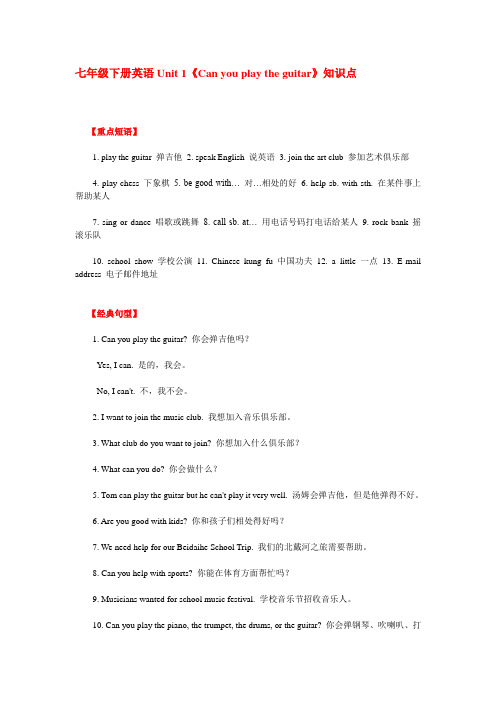
七年级下册英语Unit 1《Can you play the guitar》知识点【重点短语】1. play the guitar 弹吉他2. speak English 说英语3. join the art club 参加艺术俱乐部4. play chess 下象棋5. be good with… 对…相处的好6. help sb. with sth. 在某件事上帮助某人7. sing or dance 唱歌或跳舞8. call sb. at… 用电话号码打电话给某人9. rock bank 摇滚乐队10. school show 学校公演11. Chinese kung fu 中国功夫12. a little 一点13. E-mail address 电子邮件地址【经典句型】1. Can you play the guitar? 你会弹吉他吗?Yes, I can. 是的,我会。
No, I can't. 不,我不会。
2. I want to join the music club. 我想加入音乐俱乐部。
3. What club do you want to join? 你想加入什么俱乐部?4. What can you do? 你会做什么?5. Tom can play the guitar but he can't play it very well. 汤姆会弹吉他,但是他弹得不好。
6. Are you good with kids? 你和孩子们相处得好吗?7. We need help for our Beidaihe School Trip. 我们的北戴河之旅需要帮助。
8. Can you help with sports? 你能在体育方面帮忙吗?9. Musicians wanted for school music festival. 学校音乐节招收音乐人。
10. Can you play the piano, the trumpet, the drums, or the guitar? 你会弹钢琴、吹喇叭、打鼓还是会弹吉他?11. Please call Zhang Heng at 622-6033. 请拨打622-6033找张衡。
- 1、下载文档前请自行甄别文档内容的完整性,平台不提供额外的编辑、内容补充、找答案等附加服务。
- 2、"仅部分预览"的文档,不可在线预览部分如存在完整性等问题,可反馈申请退款(可完整预览的文档不适用该条件!)。
- 3、如文档侵犯您的权益,请联系客服反馈,我们会尽快为您处理(人工客服工作时间:9:00-18:30)。
梦,梦想()皇宫,宫殿()首都()阳台()海滩()海()镇,市镇()河,江()梯子()第二(个),第二日()孩子,儿女()雨,雨水()厨房()起居室,客厅()第五,第五日()花园,菜园()公寓,套房()第七,第七日()邻居()餐厅()扶手椅()床头柜()咖啡()矮茶几()碗橱()灯,台灯()书架,书柜()淋浴器,淋浴()洗涤槽,洗碗池()浴室,盥洗室()浴缸,淋浴()便池,抽水马桶()架子()打印机()第三,第三日()第四,第四日()第九,第九日()第十一,第十一日()第十二,第十二日()
第二十,第二十个()旅
行,
旅程()
主意,想法()录像()一楼()米,公尺()动词:
爬,攀登,攀爬()下雨()合用,分享()种植,生长()烹调,煮()到达()担心,发愁()听起来()停留,逗留,待()
梦想中的,理想的()木制的,木头的() 第二的()第五的()第七的() 友好的()大多数的()整洁的() 第三的()第四的()第九的() 第十一的()第十二的()第二十的() 安静的()自己的()其它的,另外的() 介词:
在•…的上方()
到•
•
里面()
在•…之间()在•…的对面() 在•…的上面()在•…的下面() 代词:
它的()
数词:
零()十六()十七() 十九()七十()九十() 千()百万()
连词:
当•…的时候()
短语:
住在一家餐馆隔壁()•
•
•的首都()
在世界各地()喜爱做某事()
精品文档
向外看某物(我家里的第二个孩子()进入到•…里(
)经常下雨(
)
)
在六月五日()在・••中心()
在一条热闹的街上()在7层楼上() 与某人合用/分享某物()种花(
) 做饭()在河上()爬梯子() 迫不及待地想做某事()在长途飞行旅程之后() 长城()别担心()
带某人去某地(
)颐和园(
) 故宫博物院()与•…不同()
新电话号码(
)更容易地记住(
)
至少(
)没有其他的房间(
)
与某人待在一起(
)50 米长(
) 想要某人做某事()进行淋浴() 同时()住在温迪上两层() 住在温迪下六层()
注:答案见初中英语《知识集锦》。
